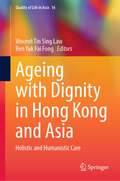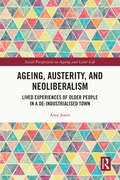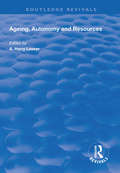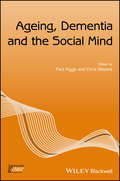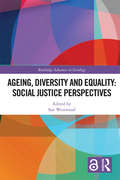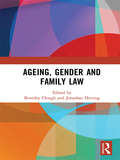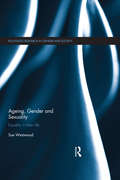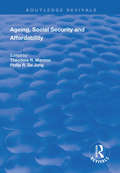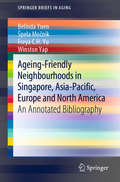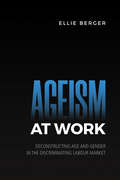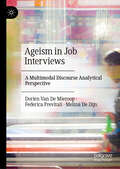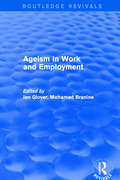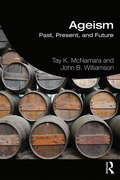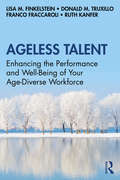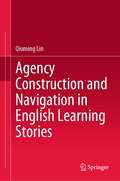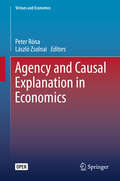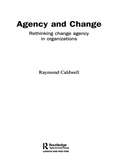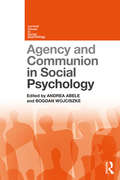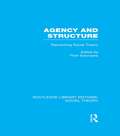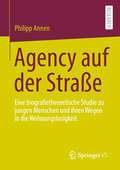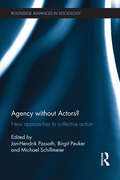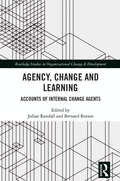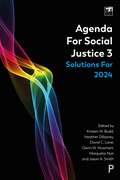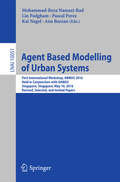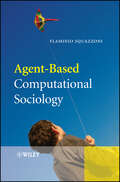- Table View
- List View
Ageing with Dignity in Hong Kong and Asia: Holistic and Humanistic Care (Quality of Life in Asia #16)
by Ben Yuk Fai Fong Vincent Tin Sing LawThis book advocates the application of holistic and humanistic approaches in elderly care and services to achieve the goal of ageing with dignity in Hong Kong and Asia. It responds to the needs of an increasing ageing population that has to deal with related health needs in long-term care, community health and social services, particularly for chronic conditions and psychosocial support. The book consists of three sections on policy and development of aged care, holistic and humanistic care for older adults, and capacity building for ageing with dignity, respectively. Topics include the latest initiatives in aged care, appropriate services and delivery models, lifestyle modification, psychosocial and environmental considerations, professional development, technologies, and social capital. The chapters review and discuss these issues within a global context, illustrated by examples from Asian countries, underpinned by locally based empirical research. Contributors include academics and practitioners from diversified professional backgrounds that include medicine, nursing, pharmacy, traditional Chinese medicine, dietetics, and allied health. The book traverses into territories in the social sciences, life sciences, and sports sciences, while also touching on areas of business and administration, hospitality, law, public policy, and information technology in connection with public health. The contents serve as a topical reference for tertiary studies in ageing and related disciplines such as well-being and are also useful to policymakers, community and public health practitioners, health executives and interns working in areas of policy and practice pertinent to care development, health delivery models, planning, quality, ethics, better health promotion, professional training, and monitoring for older adults.
Ageing, Austerity, and Neoliberalism: Lived Experiences of Older People in a De-Industrialised Town (Social Perspectives on Ageing and Later Life)
by Amy JonesThis book explores how neoliberalism and austerity have affected older people living within a deindustrialised town, utilising a Foucauldian approach and an ethnographic methodology. It seeks to bridge the gap between high sociological theory and a research focus upon older people. The link between the micro (real people, within a real place) and macro (abstract processes) is examined, and a mid-range theory of change is innovatively developed to highlight how older people are having to negotiate national transformations at the everyday level. Key themes within this book include the recreation of human subjectivity, antiwelfarism, the stigmatisation and exclusion of the poor, the fragmentation of the working class, and nostalgia. Innovative terms such as ‘stigma-adaptation’ and ‘abnormal abnormality’ are included to help deepen our knowledge and understanding of the social sciences, to highlight the injustices caused by current global processes, and to ultimately inform change. This book will be of interest to scholars and students across the social sciences, particularly those studying inequalities in the modern world, neoliberalism and the economy, social theory, ageing and older people and community studies, and postgraduates who are seeking to undertake applied research. It would also be valuable for policymakers and service providers.
Ageing, Autonomy and Resources (Routledge Revivals)
by A. Harry LesserFirst Published in 1999, lesser collects fourteen papers to create a discourse on the practical importance in a society where the proportion of elderly people is increasing. Exploring how autonomy and how it should be defined, and ethically when is it right to preserve a person’s autonomy and in comparison is it ever ethically right to bring elderly peoples autonomy as a secondary concern is it saves them from harm?
Ageing, Dementia and the Social Mind (Sociology of Health and Illness Monographs)
by Chris Gilleard Paul HiggsA groundbreaking exploration of the sociology of dementia — with contributions from distinguished international scholars and practitioners. Organised around the four themes of personhood, care, social representations and social differentiation Provides a critical look at dementia and demonstrates how sociology and other disciplines can help us understand its social context as well as the challenges it poses Contributing authors explore the social terrain, responding in part, to Paul Higgs’ and Chris Gilleard’s highly influential work on ageing Breaks new ground in giving specific attention to the social and cultural dimensions of responses to dementia
Ageing, Diversity and Equality: Social Justice Perspectives (Routledge Advances in Sociology)
by Sue WestwoodCurrent understandings of ageing and diversity are impoverished in three main ways. Firstly, with regards to thinking about what inequalities operate in later life there has been an excessive preoccupation with economic resources. On the other hand, less attention has been paid to cultural norms and values, other resources, wider social processes, political participation and community engagement. Secondly, in terms of thinking about the ‘who’ of inequality, this has so far been limited to a very narrow range of minority populations. Finally, when considering the ‘how’ of inequality, social gerontology’s theoretical analyses remain under-developed. The overall effect of these issues is that social gerontology remains deeply embedded in normative assumptions which serve to exclude a wide range of older people. Ageing, Diversity and Equality aims to challenge and provoke the above described normativity and offer an alternative approach which highlights the heterogeneity and diversity of ageing, associated inequalities and their intersections. The Open Access version of this book, available at https://www.taylorfrancis.com/books/9781351851329, has been made available under a Creative Commons Attribution-Non Commercial-No Derivatives 4.0 licence.
Ageing, Gender and Family Law
by Jonathan Herring Beverley CloughThis book explores the intersecting issues relating the phenomenon of ageing to gender and family law. The latter has tended to focus mainly on family life in young and middle age; and, indeed, the issues of childhood and parenting are key in many family law texts. Family life for older members has, then, been largely neglected; addressing this neglect, the current volume explores how the issues which might be important for younger people are not necessarily the same as those for older people. The significance of family, the nature of family life, and the understanding of self in terms of one’s relationships, tend to change over the life course. For example, the state may play an increasing role in the lives of older people – as access to services, involvement in work and the community, the ability to live independently, and to form or maintain caring relationships, are all impacted by law and policy. This collection therefore challenges the standard models of family life and family law that have been developed within a child/parent-centred paradigm, and which may require rethinking in the turn to family life in old age. Interdisciplinary in its scope and orientation, this book will appeal not just to academic family lawyers and students interested in issues around family law, ageing, gender, and care; but also to sociologists and ethicists working in these areas.
Ageing, Gender and Sexuality: Equality in Later Life (Routledge Research in Gender and Society)
by Sue WestwoodAgeing, Gender and Sexuality focuses on the experiences of older lesbian, gay and bisexual (LGB) individuals, in order to analyse how ageing, gender and sexuality intersect to produce particular inequalities relating to resources, recognition and representation in later life. The book adopts a feminist socio-legal perspective to propose that these inequalities are informed by and play out in relation to temporal, spatial and regulatory contexts. Discussing topics such as ageing sexual subjectivities, ageing kinship formations, classed trajectories and anticipated care futures, this book provides a new perspective on older individuals in same-sex relationships, including those who choose not to label their sexualities. Drawing upon recent empirical data, the book offers new theoretical approaches for understanding the intersectionality of ageing, gender and sexuality, as well as analysing the social policy implications of these findings. With an emphasis on the accounts of individuals who have experienced the dramatically changing socio-legal landscape for LGB people first-hand, this book is essential reading for students, scholars and policymakers working in the areas of: gender and sexuality studies; ageing studies and gerontology; gender, sexuality and law; equality and human rights; sociology; socio-legal studies; and social policy. Ageing, Gender and Sexuality won the Socio-Legal Studies Association (SLSA) Hart Prize for Early Career Academics for 2017.
Ageing, Social Security and Affordability (Routledge Revivals)
by Theodore R. Marmor Philip R. De JongFirst published in 1998. This volume (the second of a twin set grouping articles based on papers presented at seminars in Sigtuna, Sweden, during 1994 – 1996) deals with the largest spending programs of the welfare state – old age pensions and medical care, and their place within debates about the desirability and affordability of modern social programs. The volume is divided into four parts. The first part deals with general welfare state issues, cross-cutting themes and characterizations of whole systems within such diverse disciplines as social law, sociology and economics. Part two deals with old age pension reform. The countries discussed have widely different geographical, cultural and historical backgrounds. Part three takes up a number of interesting topics under the heading of health care reform. Part four deals with a substantial issue located and the juncture of aging, affordability, pensions and especially health care: increased longevity (and population aging) and the associated disability and frailty. What effect will these have on the future of modern welfare states?
Ageing-Friendly Neighbourhoods in Singapore, Asia-Pacific, Europe and North America: An Annotated Bibliography (SpringerBriefs in Aging)
by Belinda Yuen Špela Močnik Winston Yap Freya C.H. YuThis book brings together the emerging body of work on age-friendly neighbourhoods in Singapore, the Asia-Pacific region, Europe and North America. It begins with an overview chapter on the current state of policy, practice and research on age-friendly neighbourhoods in Singapore. This is followed by an annotated bibliography of published materials on age-friendly neighbourhoods in the above-mentioned countries and regions, encompassing theoretical work and empirical research reported on in journal articles, books and conference proceedings. The annotations for Singapore also map the grey literature, including unpublished dissertations and theses. The aim is to provide a sense of the scope of, issues in, and discourse on age-friendly neighbourhoods, the development of which is increasingly being recognised as a key strategy to support healthy ageing and enhance quality of life in ageing societies.
Ageism at Work: Deconstructing Age and Gender in the Discriminating Labour Market
by Ellie D. BergerThe Canadian population is aging, bringing with it an increasing number of social and economic challenges. With the aging of the workforce, the reconceptualization of older workers and retirement, the increasing share of women in the labour force, the elimination of mandatory retirement, the fluctuating economy, and the changes to the pension system, barriers to employment for older workers, such as ageism, need to be of central concern. Ageism at Work examines the subjective experiences of older workers in Canada and explores how they negotiate ageism and manage their interactions in the employment setting. Further, this book looks at the intersection between age and gender and the pervasiveness of gendered ageism in the labour market. Finally, this book examines employers’ attitudes towards older workers quantitatively, while also exploring their first-hand accounts about them through qualitative inquiry. Understanding how ageism plays out in the labour market, how it intersects with sexism, and its consequences on a personal level are critical to moving the discussion on discrimination and human rights forward in Canada.
Ageism in Job Interviews: A Multimodal Discourse Analytical Perspective
by Dorien Van De Mieroop Federica Previtali Melina De DijnThis book investigates age categorizations and stereotyping in job interviews by drawing on a multimodal discourse analytical approach. While previous research on ageism has focused on what happens before or after the job interview, there is substantial evidence supporting the idea that the job interview is a pivotal moment in this respect as well. This is because the way in which the interaction unfolds significantly influences not only recruiters’ ultimate hiring decisions, but also candidates’ interest in pursuing the job offer further. This phase in the recruitment process is thus deserving of further scrutiny when it comes to ageism. The authors delve into age stereotypes regarding ‘old’ as well as ‘young’ age and tease out how they are ‘talked into being’ during job interviews, both by recruiters and candidates. By shedding light on the discursive dynamics of age-based prejudice, stereotyping and discrimination, this books thus aims to further understanding regarding how ageism actually plays out in in real life job interview interactions. The book will be of interest to academics working in fields including interactional sociolinguistics, pragmatics, diversity studies, human resource management and discursive psychology.
Ageism in Work and Employment (Routledge Revivals)
by Ian Glover and Mohamed BranineThis title was first published in 2001. This collection of essays on the the subject of ageism in work and employment arose out of the international conference held at Stirling University in July 1996. The book addresses various topics within this issue including the problem and its causes; the experience and practice of age discrimination in employment; and remedies and prospects.
Ageism: Past, Present, and Future
by Tay K. McNamara John B. WilliamsonAgeism: Past, Present, and Future presents perspectives for understanding ageism and puts ageism in the context of specific social institutions. McNamara and Williamson uniquely provide a number of complementary ways to understand ageism, including social and psychological theories of ageism, economic development, ageism as frame or lens, and ageism at the intersection of various social categories such as gender and race. They then put ageism in the context of mass media, h ealth care, employment, and public policy. This short text is an ideal addition to courses on sociology of aging, social policy, and social problems.
Ageless Talent: Enhancing the Performance and Well-Being of Your Age-Diverse Workforce
by Lisa M. Finkelstein Franco Fraccaroli Donald M. Truxillo Ruth KanferAgeless Talent: Enhancing the Performance and Well-Being of Your Age-Diverse Workforce provides organizational leaders, managers, and supervisors with clear, evidence-based tactics by which to develop and manage an aging and age-diverse talent pool. This volume provides an easy-to-implement set of tools for addressing the difficult problems related to employee performance and well-being amid ongoing technological and social change. Ageless Talent introduces a straightforward framework (PIERA) that translates scientific advances into actionable steps and strategies. Using this framework, this book provides practical illustrations to help readers design their own small-scale interventions to achieve desirable goals under diverse organizational constraints. Furthermore, the book addresses modern management challenges arising across the globe, and offers suggestions for leaders interested in short-term and long-term change. These suggestions, grounded in time-tested and leading-edge research evidence, include specific step-by-step guidelines, customizable to different types of organizations and industries. With economic, cultural, technological, and demographic shifts making the changing nature of work a pressing concern for organizations around the globe, Ageless Talent is an essential text for practitioners – HR professionals, organizational leaders, and managers – as well as management education programs and professional training and leadership programs. It will also appeal to instructors and students in the field of industrial/organizational psychology.
Agency Construction and Navigation in English Learning Stories
by Qiuming LinThis book presents a longitudinal research which covers a linguistic approach to understand and observe language learner agency. It makes connections between agency in discourse analyses and agency in applied linguistics by examining how learner agency is manifested in autobiographic oral narratives and influenced by contextual factors. This book also demonstrates that agency is not a fixed entity that English learners possess, but a dynamic construct constantly negotiated by the learners with the social world. It is the result of their identity positioning and repositioning within a complex and ever-changing context. Learner identities, either actual or imagined, are significantly correlated with their investment in English and their English learning process.This book sheds new light on teaching English as a foreign language and gives inspirations for enhancing English learners’ agency in contemporary context of China. As learner agency should be treated in a dynamic and process view, a low level of agency manifested in a particular period or in a certain context may not necessarily persist in later periods or extend to other contexts. Provided with supportive contextual conditions and taking on positive and powerful identities, language learners are well on the course for higher levels of agency.
Agency and Causal Explanation in Economics (Virtues and Economics #5)
by László Zsolnai Peter RónaThis open access book provides an exploration of the consequences of the ontological differences between natural and social objects (sometimes described as objects of nature and objects of thought) in the workings of causal and agency relationships. One of its important and possibly original conclusions is that causal and agency relationships do not encompass all of the dependent relationships encountered in social life. The idea that social reality is contingent has been known (and largely undisputed) at least since Wittgenstein’s “On Certainty”, but social science, and most notably economics has continued to operate on the basis of causal and agency theories borrowed or adapted from the natural sciences. This volume contains essays that retain and justify the partial or qualified use of this approach and essays that totally reject any use of causal and agency theory built on determined facts (closed systems).The rejection is based on the possibly original claim that, whereas causation in the objects of the natural sciences reside in their properties, human action is a matter of intentionality. It engages with critical realist theory and re-examines the role of free will in theories of human action in general and economic theory in particular.
Agency and Change: Rethinking Change Agency in Organizations (Routledge Studies in Organizational Change & Development)
by Raymond CaldwellThis excellent book remaps the limits and possibilities of change, clearly shifting the focus from outmoded debates on agency and structure to new practice-based discourses on agency and change. Offering readers a selective and critical review of key literature and empirical research, it will help students contextualize this complex subject area and independently evaluate future prospects for effective change agent roles in organizations Presenting an interdisciplinary exploration of competing discourses, the book uses two overarching conceptual continua: centred agency-decentred agency and systems-processes, thereby allowing a more intensive focus on agency and change. Well-written with challenging content, this book is essential reading for those interested in the origins, development and future prospects for change agency in an organizational world characterized by increasing complexity, risk and uncertainty.
Agency and Communion in Social Psychology (Current Issues In Social Psychology Ser.)
by Bogdan Wojciszke Andrea E. AbeleWhat are the ultimate motives that instigate individuals’ behaviours? What are the aims of social perception? How can an individuals’ behaviour be described both from the perspective of the actor and from the perspective of an observer? These are the basic questions that this book addresses using its proposed agency-communion framework. Agency (competence, assertiveness) refers to existence of an organism as an individual, to "getting ahead" and to individual goal-pursuit; communion (warmth, morality) refers to participation of an individual in a larger organism, to "getting along" and to forming bonds. Each chapter is written by experts in the field and use the agency-communion framework to explore a wide variety of topics, such as stereotypes, self-esteem, personality, power, and politics. The reader will profit from the deep insights given by leading researchers. The variety of theoretical approaches and empirical contributions shows that the parsimonious and simple structure of two types of content in behavior, motives, personality, self-concept, stereotypes, and more to build an overarching frame to different phenomena studied in psychology.
Agency and Structure: Reorienting Social Theory (Routledge Library Editions: Social Theory)
by Piotr SztompkaA striking feature of the human condition is its dual, contradictory, inherently split character; on the one hand, autonomy and freedom; on the other, constraint and dependence on social structure. This volume addresses this central problem of the linkage between human action and social structure in sociological and social science theory. Contributions cover several different approaches to the agency-structure problematic, and represent the work of a number of leading international sociologists. Their efforts point to a reorientation of social theory, both on philosophical and methodological levels.
Agency auf der Straße: Eine biografietheoretische Studie zu jungen Menschen und ihren Wegen in die Wohnungslosigkeit
by Philipp AnnenDiese Studie liefert eine differenzierte Analyse der Dynamiken, die dazu führen, dass junge Erwachsene wohnungslos werden. Sie gewährt einen Einblick in die Komplexität dieses sozialpolitisch brisanten und sozialpädagogisch herausfordernden sozialen Problems. Die Wegemetapher im Untertitel verweist dabei auf das zentrale Anliegen der Studie: Mittels eines qualitativen Forschungsdesigns sowie eines biografie- wie agencytheoretischen Zugangs werden die den biografischen Verläufen der jungen Erwachsenen immanenten Prozessstrukturen rekonstruiert. Auf der Basis von Fallanalysen wird die Verwobenheit und das Zusammenspiel von strukturellen wie individuellen Ursachen der Wohnungslosigkeit herausgearbeitet.
Agency without Actors?: New Approaches to Collective Action (Routledge Advances in Sociology)
by Jan-Hendrik Passoth Michael Schillmeier Birgit PeukerThe question of agency is a key issue in social theory and research. The discourse of human agency as an effect of social relations is deeply intertwined with the history of sociological thought. However, in most recent discussions the role of non-humans gains a substantial impact concerning agency. Agency without Actors? New Approaches to Collective Action asks: Are nonhumans active, do they have agency? And if so: how and in which different ways? Consequently, Agency without Actors? New Approaches to Collective Action outlines a wide range of novel accounts that link human and non-human agency tries to understand social-technical, political and environmental networks as different forms of agency that produce discrete and identifiable entities asks how different types of (often conflicting) agency and agents are distinguished in practice, how they are maintained and how they interfere with each other. By studying the substantial impact of the role of non-humans in connection with human relations, the book aims to advance the discourse on agency and investigates into the different possible modes of human and nonhuman interplay. This book is essential reading for students and scholars of sociology, science and technology studies, social anthropology, animal studies, environmental studies and social theory.
Agency, Change and Learning: Accounts of Internal Change Agents (Routledge Studies in Organizational Change & Development)
by Bernard Burnes Julian RandallDespite the plethora of books on change, there appears a notable gap in the field; rarely is the authentic and candid voice of change agents heard. How often do academics or practitioners candidly state what they actually do when they are faced with managing change in their own organisations or when they are called on in a consultancy capacity? In this new book, the editors bring together a diverse group of contributors who have worked as Internal Change Agents in organizations to divulge what they really do and think about change. The authors draw on their own research work involving change agents and their change interventions and include current reflections on the post-Covid world of work, and the change required for achieving change interventions successfully. Each contribution offers perspectives from real change programmes, in both the public and private sector, offering a unique opportunity to move beyond theory and understand change in practice. The book offers valuable insights for academics and students of organisational change and behaviour, leadership and organisational development.
Agenda for Social Justice 3: Solutions for 2024 (SSSP Agendas for Social Justice)
by Sophie Webb Teresa A. Sullivan Dana Johnson Blake R. Silver Katie Kerstetter Gabriela Gonzalez Ashley C. Rondini Ashley N. Gwathney Brooke Cordes Charity Anderson Drew Bonner Elroi Windsor Hayley Carlisle Jeanne Kimpel Kristen Burke Lance Hannon Lindsay Redditt McKenzie Berezin Meredith Van Natta Monique Harrison Nazgol Ghandnoosh Raquel Rose Sarah Jane Brubaker Sydney Ingel Tiffany Joseph Tony Samara Mary BernsteinThe Agenda for Social Justice 3: Solutions for 2024 provides accessible insights into some of the most pressing social problems and proposes public policy responses to those problems. Written by a highly respected team of authors brought together by the Society for the Study of Social Problems (SSSP), the book offers recommendations for action by elected officials, policymakers and the public regarding key issues for social justice. Chapters include discussion of social problems related to criminal justice, the economy, food insecurity, education, healthcare, housing and immigration. The book will be of interest to scholars, practitioners, advocates and students interested in public sociology, the study of social problems and the pursuit of social justice.
Agent Based Modelling of Urban Systems: First International Workshop, ABMUS 2016, Held in Conjunction with AAMAS, Singapore, Singapore, May 10, 2016, Revised, Selected, and Invited Papers (Lecture Notes in Computer Science #10051)
by Mohammad-Reza Namazi-Rad Lin Padgham Pascal Perez Kai Nagel Ana BazzanThis book constitutes revised, selected, and invited papers from the First International Workshop on Agent Based Modelling of Urban Systems, ABMUS 2016, held in conjunction with AAMAS 2016 in Singapore in May 2016. The 11 papers presented in this volume were carefully reviewed and selected from 20 submissions. They were organized in topical sections named: urban systems modeling; traffic simulation in urban modeling; and applications.
Agent-Based Computational Sociology
by Flaminio SquazzoniMost of the intriguing social phenomena of our time, such as international terrorism, social inequality, and urban ethnic segregation, are consequences of complex forms of agent interaction that are difficult to observe methodically and experimentally. This book looks at a new research stream that makes use of advanced computer simulation modelling techniques to spotlight agent interaction that allows us to explain the emergence of social patterns. It presents a method to pursue analytical sociology investigations that look at relevant social mechanisms in various empirical situations, such as markets, urban cities, and organisations. This book:Provides a comprehensive introduction to epistemological, theoretical and methodological features of agent-based modelling in sociology through various discussions and examples.Presents the pros and cons of using agent-based models in sociology.Explores agent-based models in combining quantitative and qualitative aspects, and micro- and macro levels of analysis.Looks at how to pose an agent-based research question, identifying the model building blocks, and how to validate simulation results.Features examples of agent-based models that look at crucial sociology issues.Supported by an accompanying website featuring data sets and code for the models included in the book. Agent-Based Computational Sociology is written in a common sociological language and features examples of models that look at all the traditional explanatory challenges of sociology. Researchers and graduate students involved in the field of agent-based modelling and computer simulation in areas such as social sciences, cognitive sciences and computer sciences will benefit from this book.
